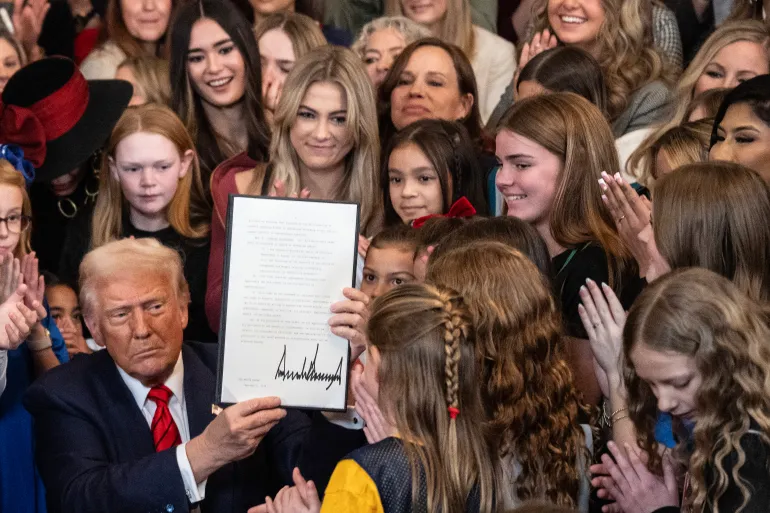In a highly controversial move, United States President Donald Trump has signed an executive order that prohibits transgender women and girls from participating in female sports. This decision has ignited fierce debates across the country, drawing sharp criticism from LGBTQ+ advocacy groups and civil rights organizations while receiving support from some athletic bodies and conservative groups. The executive order not only impacts school sports but also sets a precedent that could influence international athletic policies.
Signed on Wednesday, the executive order stipulates that any educational institution receiving federal funding must comply with sex-based sports categories. Failure to do so could result in the loss of government support, placing schools in a difficult position as they navigate compliance and inclusivity. The order also mandates federal agencies to advocate for sex-based sports divisions at international platforms, including pushing the International Olympic Committee (IOC) to revise its policies ahead of the 2028 Summer Olympics in Los Angeles.
“We are putting every school receiving taxpayer dollars on notice: If you let men take over women’s sports teams or invade your locker rooms, you will be investigated for violations of Title IX and risk your federal funding,” Trump declared, referencing the 1972 law that prohibits sex-based discrimination in educational programs. This statement has been met with both applause from proponents of traditional gender roles in sports and outrage from civil rights activists who argue it infringes upon the rights of transgender individuals.
The participation of transgender athletes in sports has long been a contentious issue in the United States, polarizing public opinion. According to a 2023 Gallup poll, 69% of Americans believe transgender athletes should compete against individuals of the same biological sex, reflecting a growing trend of opposition compared to previous years. This statistic underscores the cultural divide on the issue, with strong opinions on both sides.
Supporters of the executive order argue it safeguards the integrity of women’s sports, ensuring fair competition. They believe that biological differences can provide competitive advantages in sports, thus necessitating clear distinctions. Charlie Baker, President of the National Collegiate Athletics Association (NCAA), expressed cautious support, stating, “Clear, consistent, and uniform eligibility standards would best serve today’s student-athletes instead of a patchwork of conflicting state laws and court decisions.” This sentiment echoes the concerns of many athletic organizations striving for clarity in eligibility criteria.
However, the order has been met with strong opposition from LGBTQ+ rights organizations. GLADD, one of the largest advocacy groups in the U.S., condemned the order, calling it “inaccurate and incoherent.”
“All women and girls, including transgender women and girls, should be welcome to play sports, make decisions about their own bodies, and live free from discrimination,” GLADD stated. Similarly, Athlete Ally, another advocacy group, criticized the administration for targeting marginalized communities and vowed to continue advocating for inclusive sports environments. They argue that the order not only discriminates against transgender athletes but also perpetuates harmful stereotypes and stigmas.
This is not the first time Trump has targeted transgender rights through executive action. Since taking office, he has signed several orders affecting the transgender community, including bans on military service for transgender individuals and restrictions on gender-affirming healthcare for minors. These actions form part of a broader pattern that critics argue systematically undermines the rights of LGBTQ+ individuals.
While the number of transgender athletes is relatively small, their presence in competitive sports has become a lightning rod in broader cultural and political battles over gender identity and civil rights. High-profile cases, such as that of college swimmer Lia Thomas, who won the NCAA Division I national championship in 2022 before being barred from women’s events by World Aquatics, have kept the issue in the public eye.
The new executive order could have far-reaching implications, influencing not just school sports programs but also shaping international discussions on gender inclusion in athletics. It raises questions about how sports organizations, both domestic and international, will navigate the complex intersection of science, ethics, and human rights.
Legal challenges are expected as civil rights groups prepare to contest the order in court. These challenges will likely focus on potential violations of constitutional rights, including equal protection under the law. Meanwhile, educational institutions and sports organizations nationwide are grappling with how to comply with the new regulations while balancing inclusivity and fairness.
Internationally, the order could pressure global sports governing bodies to reevaluate their policies regarding transgender athletes. The International Olympic Committee, for example, may face renewed calls to adopt stricter regulations, which could affect athletes worldwide.
Beyond the legal and ethical dimensions, the executive order may also have economic implications. Schools and sports organizations could face financial strain from potential lawsuits and the loss of federal funding. Additionally, the order could impact the mental health and well-being of transgender youth, who may feel further marginalized and excluded from important social activities.
As this story continues to develop, it remains a focal point in the ongoing national conversation about gender, rights, and the role of government in personal identity issues. The outcome of legal battles and public response will likely shape future policies not just in the United States, but also influence global perspectives on transgender rights and sports.
For continuous updates on this and other significant stories in politics, technology, innovation, and business, subscribe to Innovation Times. Stay ahead with expert insights and in-depth analyses that matter to you. Join the conversation, share your thoughts, and be part of a global community engaged in shaping the future.
Stay ahead with the latest news on global innovation, leadership, entrepreneurship, business, and tech. Join us on WhatsApp or Telegram for real-time updates. Have a report or article? Send it to report@theinnovationtimes.com.
Follow us on X (Twitter), Instagram, LinkedIn, Pinterest and Facebook for more insights and trends



